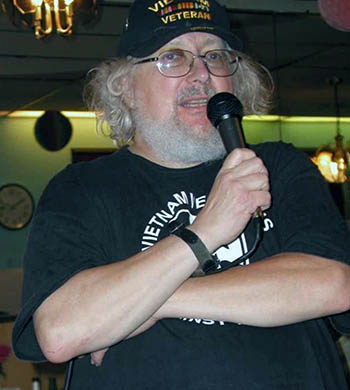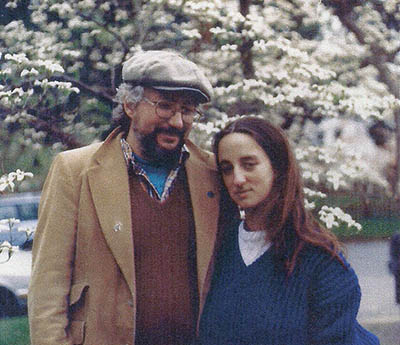 |
Dave Curry: How Atheists Sing in ChurchBy Janet Bonham Curry
As many of you surviving spouses may know, the first few times we are called upon to tell our loved one's story, without him or her around, it is not easy. Among the most completely bizarre and entirely fitting truths about David Curry is that he wrote by far and away the best account of his own life while already years—deep into the multiple afflictions that finally took his life this April. The story I want to tell here though starts with a story his father, Minter Glen Curry, told by David, from the beginning. By the time I met David in Chicago in 1985, he had survived early childhood in the town of Kimball, McDowell County, aka the Free State of McDowell, in West Virginia, where his dad and grandfather were coal miners. In the terms of this region, 66 years old is long-lived. Kimball is northeast of Coalwood, where Homer Hickam, the nonfictional rocket boy of October Sky was born, 5 years before David. Kimball is also just east of Welch, the McDowell county seat, where David's dad took him to see the blood on the county courthouse steps where Matewan Sheriff Sid Hatfield was assassinated. Matewan is the town in Mingo county, adjacent to McDowell, home of the Battle of Matewan, in which Sheriff Hatfield refused to allow the coal company's hired Baldwin-Felts detectives to evict unionized miners from their homes in the spring of 1920. Albert and Lee Felts had carried out several evictions and were on their way back to Bluefield when Sheriff and Mayor Cabell Testerman determined the Felts' warrants for Hatfield's arrest to be fraudulent. Hatfield and Testerman confronted the Felts to discuss the matter. The Felts failed to anticipate the armed miners watching, hidden in doorways, just behind windows, up on the roofs. The Battle left 7 detectives, including two of the Felts brothers, and 3 townsmen dead, including the Mayor. This was the precursor to the more well-known Battle of Blair Mountain, 5 days in August and September in 1921, when 10,000 miners hiked to Logan County, faced down 3,000 law enforcement and scabs; a million rounds were fired, plus remaining bombs and gas from WWI were used by the US Army to try to school these righteous miners in correct worker decorum. Hatfield, though acquitted by the jury of Matewan Battle-related murder charges, was brought up on conspiracy charges from another case in 1921. On Hatfield's way to that trial, along with his co-defendant and their wives, unarmed, he was shot to death by Baldwin-Felts agents, who were never convicted, claiming self-defense. By the time David's dad had been withered by a life of the heaviest physical labor, black lung, two legs and an arm paralyzed by strokes, he was using his good arm to leaflet on behalf of striking nurses at his WV nursing home, stashing more literature in the one bureau drawer he could reach. As a kid, David had rescued his younger sister and brother from a would-be fatal encounter with a hornet's nest; and had also rescued Charles Darwin's Origin of Species in a fierce debate with his 5th grade hard shell Baptist Creationist teacher. Somehow, the early fear that stayed with him, though, until he began to take Zoe to the zoo, was when a bullying older girl had told him that giraffes are able to spit poison. The family moved through Appalachia to Virginia, then to Mississippi, as the mining jobs disappeared, as McDowell, nationally famous for its coal production records, began, in the late 1950s, to set state records for highest percentage of loss. While plenty of fathers left their families behind, David's stayed together, though the times and typical family dynamics took a great toll from his mother, and ultimately, took childhood from David, as he worked his way from job to job, trying to help out. His prodigious math scores, his community college and ROTC experience, and his Vietnam ordeal and stunning aftermath are best read in his Third Turkey essay (on pages 24-27).
I met David while I was in grad school at the University of Chicago, and as I was getting to know him, to know this story, and now that you know a bit more of it too, you can probably appreciate the sheer bewildered joy with which I learned that the nickname his 5th grade Unitarian religious education students had for him was Mr. Boring. An aspirational title beyond those boys' and girls' wildest dreams. As I saw him with his students, specially chosen for their regular teacher's designations as 'incorrigibles', two things shone through for me. First, the way these kids just glued themselves to him, waiting with total greed for the wicked dry humor lines, and took off with keen interest in his lessons on Islam, Buddhism, Zoroastrianism, Hinduism, Judaism — he built these relationships with these kids as fellow-travelers. And this is how I saw him relate to every other student I met or heard of since, to his dissertation advisor's grandkids whom we babysat together, to his math students in medium security, to Hannah and Kathleen's cats, to my own preschool students, to his undergrad and grad students at West Virginia University, and then at the University of Missouri at St. Louis. He was fully entitled to pull rank in a dozen dimensions — academic, military, poverty-cred, leftist; and he certainly had a ROTC commander's voice if needed; but that was not him. He was the best possible partner, the best possible father. Second, when he sang in church, and the Unitarian sacred music list included all kinds: We Shall Overcome, Lift Every Voice, Hatikva, Des Colores, John Henry, 16 Tons, This Land is Your Land — he sang not loudly, not softly either, but in a far deeper, rounder voice than I ever heard him use anywhere else. Here was a voice, I thought, that had sang out from that coal-mining spiritual DNA going way, way, back in time, way back through the days of Tom Joad, of the Russian Revolutionaries, of the nation of Haitian ex-slaves, of Thomas Paine, of Galileo, of all the unnumbered ones who worked, who read and argued back, who stood up against oppression, who mourned their dead and fought like hell for the living. David never had much faith in an afterlife, but he did warn that he had a really long list of human suffering-related, laser-sharp U of C-powered questions, should it turn out, unlike Apocalypse Now, that there is somebody in charge. There he'll be, in that scenario, doing differential equations on the back of envelopes while he waits in line. Nelson Mandela might not be finished yet. Freddy Gray probably made a new, helpful friend. Either way, however that big mystery turns out, one thing I know, without question, without doubt. Your dad, Zoe, is here, right here, for always, guarding you, from the bookshelf (1), and through so many of you VVAW comrades, Barry, Bill, Charlie, Joe, Jeff, Claudia, Janette, Alba, Hannah, Kathleen, for ever and for always. 1. image from 'Becoming a Book', a poem by Howard Schwartz, The Library of Dreams. Kansas City: University of Missouri-Kansas City BkMk Press, 2013. Janet, VVAW member since 1986, married David Curry on Bastille Day, 1988. They moved to West Virginia in 1989, where they adopted their daughter Zoe. Janet currently teaches history and government at University City High School in St. Louis, Missouri.
|



